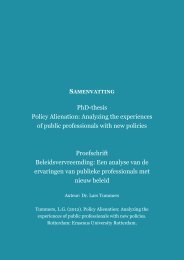PhD-thesis Policy Alienation: Analyzing the ... - Lars Tummers
PhD-thesis Policy Alienation: Analyzing the ... - Lars Tummers
PhD-thesis Policy Alienation: Analyzing the ... - Lars Tummers
You also want an ePaper? Increase the reach of your titles
YUMPU automatically turns print PDFs into web optimized ePapers that Google loves.
287 | A P P E N D I X 1<br />
Table A1.1 Items in <strong>the</strong> policy alienation measurement instrument<br />
<strong>Policy</strong> alienation measurement instrument<br />
Strategic powerlessness<br />
1. In my opinion, professionals had too little power to influence <strong>the</strong> policy<br />
2. We professionals were completely powerless during <strong>the</strong> introduction of <strong>the</strong> policy<br />
3. Professionals could not at all influence <strong>the</strong> development of <strong>the</strong> policy at <strong>the</strong> national level<br />
(Minister and Ministry of X, National Government)<br />
4. On a national level, professionals could influence how <strong>the</strong> policy was set up (R)<br />
5. Professionals, through <strong>the</strong>ir professional associations, actively helped to think with <strong>the</strong> design of<br />
<strong>the</strong> policy (R)<br />
6. Politicians did not, during <strong>the</strong> design of <strong>the</strong> policy, listen to <strong>the</strong> professionals at all<br />
Tactical powerlessness<br />
7. In my organization, especially professionals could decide how <strong>the</strong> policy was implemented (R)<br />
8. In my organization, professionals have, through working groups or meetings, taken part in<br />
decisions over <strong>the</strong> execution of <strong>the</strong> policy (R)<br />
9. The management of my organization should have involved <strong>the</strong> professionals far more in <strong>the</strong><br />
execution of <strong>the</strong> policy<br />
10. Professionals were not listened to about <strong>the</strong> introduction of <strong>the</strong> policy in my organization<br />
11. In my organization, professionals could take part in discussions regarding <strong>the</strong> execution of <strong>the</strong><br />
policy (R)<br />
12. I and my fellow professionals were completely powerless in <strong>the</strong> introduction of <strong>the</strong> policy in my<br />
organization<br />
Operational powerlessness<br />
13. I have freedom to decide how to use <strong>the</strong> policy (R)<br />
14. While working with <strong>the</strong> policy, I can be in keeping with <strong>the</strong> client’s needs (R)<br />
15. Working with <strong>the</strong> policy feels like I am in a harness in which I cannot easily move<br />
16. When I work with <strong>the</strong> policy, I have to adhere to tight procedures<br />
17. While working with <strong>the</strong> policy, I cannot sufficiently tailor it to <strong>the</strong> needs of my clients<br />
18. While working with <strong>the</strong> policy, I can make my own judgments (R)<br />
Societal meaninglessness<br />
19. I think that <strong>the</strong> policy, in <strong>the</strong> long term, will lead to goal 1 (R)<br />
20. I think that <strong>the</strong> policy, in <strong>the</strong> short term, will lead to goal 1 (R)<br />
21. I think that <strong>the</strong> policy has already led to goal 1(R)<br />
22. Overall, I think that <strong>the</strong> policy leads to goal 1 (R)<br />
Client meaninglessness<br />
23. With <strong>the</strong> policy I can better solve <strong>the</strong> problems of my clients (R)<br />
24. The policy is contributing to <strong>the</strong> welfare of my clients (R)<br />
25. Because of <strong>the</strong> policy, I can help clients more efficiently than before (R)<br />
26. I think that <strong>the</strong> policy is ultimately favorable for my clients (R)<br />
287



